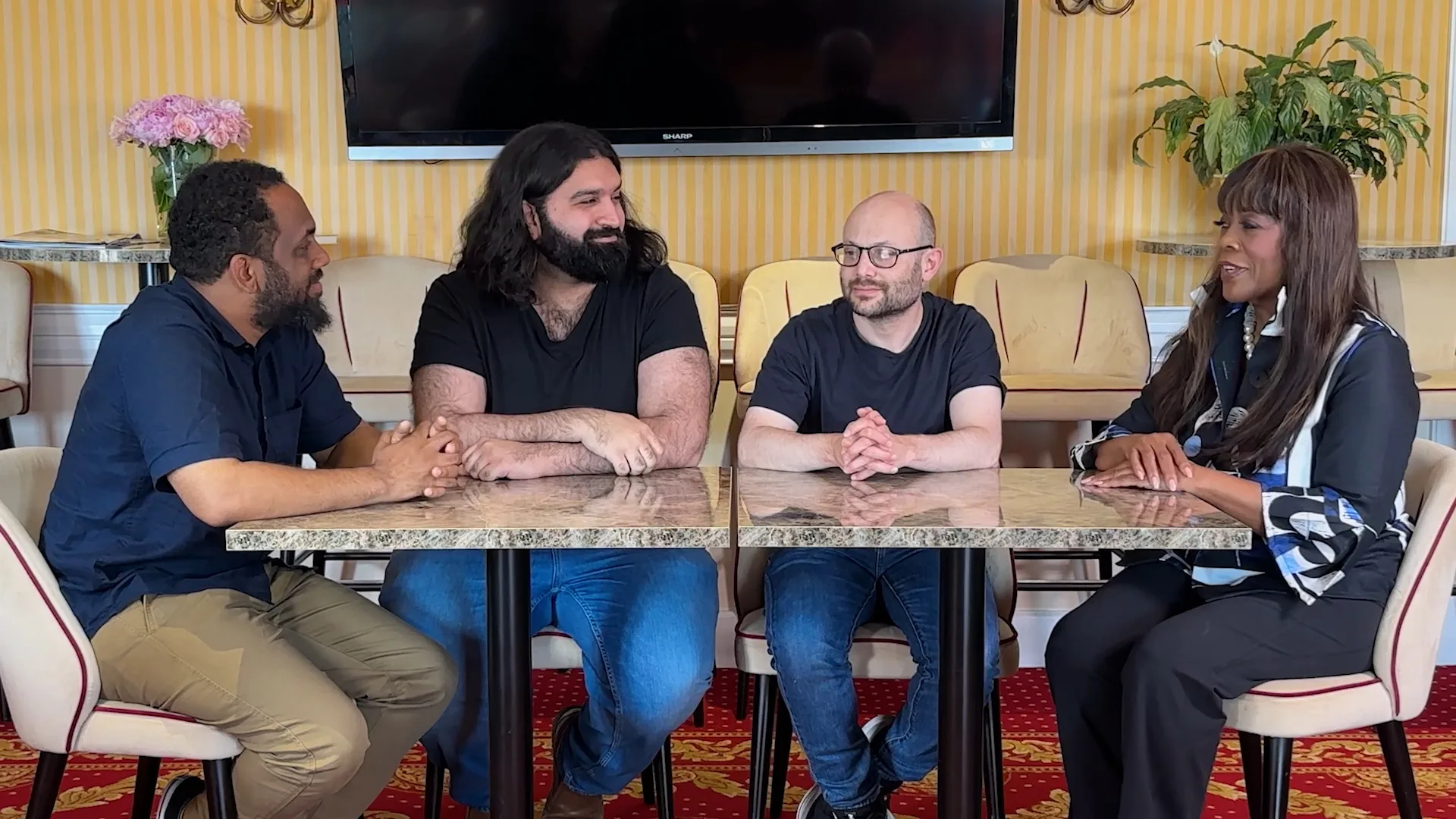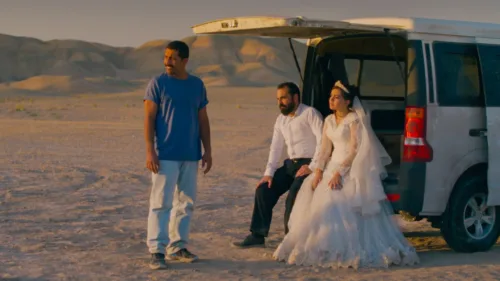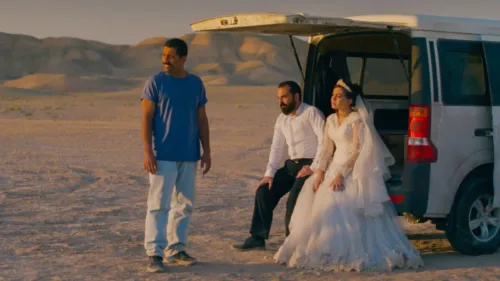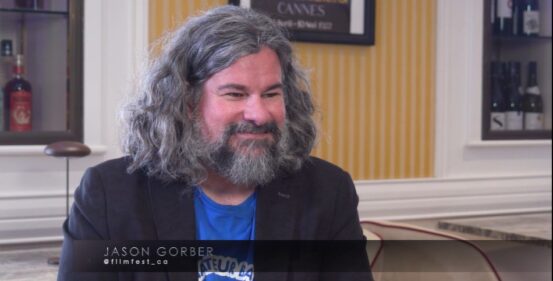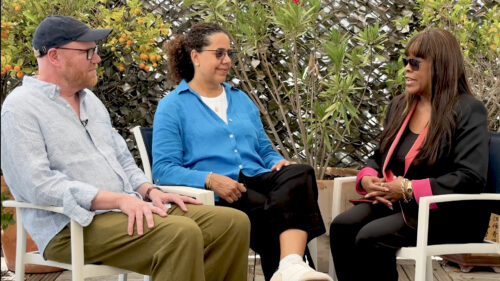With the 2025 Cannes Film Festival in our rear view mirror, we still bring more insights into Chaz Ebert‘s coverage of the fest. In this video, critics Ben Kenigsberg, Robert Daniels, and Siddhant Adlakha speak with Chaz about their findings on the festival’s offerings. Watch the video and read the transcript below.
Chaz
We are at a point in the festival that has become one of my favorites. The Critics roundtable. And today I have with me Ben Keniserg, our New York correspondent. Robert Daniels at the end of the table. He’s our Chicago correspondent. And we have a new addition, Siddhant Adlakha, who’s also from New York. Welcome, guys.
Ben
Thank you. Thanks for having us.
Chaz
So let’s get right to it. What are some of the films that you’ve seen? Let’s start with you, Ben, that you liked at the festival this year for your 2025?
Ben
Well, it’s funny, in competition, one of the ones I can’t stop thinking about is one of the ones that screened last. Kelly Reichardt’s “The Mastermind”, which is this very restrained kind of caper movie, with, a former art student turned carpenter. Who decides to rob a mid-level museum and really doesn’t think it through. And it’s not exactly a comedy, but it it’s not exactly a thriller either.
It’s really about process.
Chaz
And what did you two think of that film?
Siddhant
I actually didn’t see it, so I’m going to throw it to Robert.
Robert
You know, I greatly enjoyed the film, too. I’m a massive fan of Kelly Reichardt’s work. And, of course we’re not going to spoil it, but it’s definitely one of those films where you can tell she had the last shot first and worked backwards from that to try to figure out, you know, how to how to get there.
Well, it’s very it’s a very fascinating character for Josh O’Connor, who’s like, just a slight star on the rise and has gotten really good at kind of playing guys who are like, had this kind of, I don’t want to say suaveness, but like, there’s like a politeness to them, but they’re also sleazy.
Chaz
Josh O’Connor was in one of the one of the other competition films, I think.
Robert
Yes. “History of Sound”
And, I think he’s better here than in “History of sound”, in fact. Mostly because I think he’s working with a better script. But, but. Yeah, and I it’s it’s definitely, as Ben said, it’s kind of it’s a kind of genre bender because, like, it’s a thriller, but it’s a Kelly Reichardt kind of thriller.
Chaz
I did not know how to categorize it.
Robert
Yeah, especially with the uptempo, kind of kinetic jazz score that’s like going along with it. It just kind of throws you down like a rabbit hole, so to speak.
Chaz
Let’s move on to our newest correspondent here. So, Siddhant, tell us what would have been one of your 1 or 2 of your favorite films here at the festival?
Siddhant
I think my absolute favorite film of the festival is, your country is Norwegian drama “Sentimental Value”, which is about a distant father played by Stellan Skarsgard. Trying to cast his stage actress daughter, played by Renata Reinsve, in a film that he’s making. And it’s a part that he’s written especially for her. And, it’s in a way about art and cinema as therapy, which is, you know, it’s not the first time a movie has been about that subject, but what I found fascinating is it’s also, in its own way, about the limits of that approach to art.
And in the process, it becomes both really dramatically rigorous and also incredibly soothing. And it’s it’s a film that, you know, where both of those opposing forces kind of just seeped under my skin. For a lot of the runtime.
Robert
Yeah. There’s the, the art, you know, as as recovery. And there’s also, like, we, you know, the sensuality of the home, the family home in the movie, you know, where it very much is about, multi generational trauma and, how it’s almost like how that trauma can be a residue not just on the people, but also on the places they inhabit.
And how that kind of, feeds into art. But like you said, it like, you can’t really heal that through art. I mean, it’s it’s just not that simple. And especially not just when and when the wounds are open between father and daughter, but when that’s a reaches back through generations.
Chaz
So healing through art, but healing through what? Human interaction. Right. You have to confront it.
Siddhant
Or or I think just being willing to take that first step towards healing, whether it’s, you know, recognizing your own pain or the pain you’ve caused others or it’s, you know, putting aside or letting go of your ego. That’s something the film treats as a much more complicated thing than just a simple answer. You know, we we tend to talk about a lot of these movies in a very, like, award sense or just, you know, a quick bites of what did you like?
What did you like? At the end of the day, the best ones, you know, do touch us in, like, really personal ways. One that I found that really did that for me. I know it’s not in competition was Kristen Stewart’s directorial debut “The Chronology of Water.”
Chaz
Okay, I haven’t seen that.
Siddhant
It’s, it’s based on the memoir of a, a college swimmer, who went on to become a writer. It’s about the, you know, abuse she faced growing up. And it’s a lot of, like, you know, terrible stuff. And I, you know, personally, I haven’t gone through anything, you know, remotely to that degree. But what I really appreciated about the film that touched me in a very personal way was its use of sound and editing to create these really jagged rhythms that sort of recreate the sensation of trauma from the past coming back to you in the present.
And so I completely get, you know, you know, a movie here, even in this professional environment that we’re in, you know, stirring up, like, really personal feelings. Yeah.
Chaz
Why don’t we switch gears here a little bit and talk about which film do you think will win the Palme d’Or and which one would you prefer to win? The Palme d’Or? Let’s do first. Which film do you think will win the Palme d’Or?
Ben
You know, I never know what the jury is going to do. I would give the slight edge to Jafar Panahi, his film “It Was Just an Accident” because it seems like first off, it’s very good. Second, it’s a film that you can see having, broad consensus on the jury in terms of bridging people who are sort of, I would think, would be more inclined toward cerebral cinema and people who are inclined to more, emotional cinema, and and notions.
Chaz
Juliette Binoche is the president of the jury.
Ben
That’s right. And of course, the story of Jafar Panahi has returned to Cannes after so many years of of being under house arrest and being unable to travel. I mean, that in itself, I mean, giving I don’t want to suggest that the film itself isn’t worthy of the Palme because it is, but that in itself gives it a little extra, makes it a bit of an extra statement.
Siddhant
I would also put his film right up there. And just going off what you said, I don’t I don’t think that that element of it, you know, the story of Panahi himself. I don’t think that’s actually separate from the movie, because it’s a movie that has a lot of anger towards the system that he’s been, you know, fighting for decades.
You know, through his cinema and, through, you know, in-person activism as well, which, you know, got him arrested not that long ago. And this is, you know, his his first film he’s made since leaving, since being released from prison. And, that also very much shows in In the fury of the work. And I think that’s a reason it could very well win.
I would be happy if it won, even though my favorite film, which I, you know, I personally think should be “Sentimental Value”, but it’s one where, you know, if if Panahi were to win the Palme I would not be remotely upset.
Chaz
All right. Robert?
Robert
Yeah? I’m in the same boat. I think it’s between Panahi and Trier. You know, I, you know, I really think those are the two. And usually, I mean, Ben, you’re right. It’s, like, hard to predict what the jury’s going to do. Like, the jury doesn’t usually go with, their duel narrative. But Trier came into this festival kind of, you know, like he’s had all these successes, but he’s never won the Palme.
And if the film that he brings is good, he has to be like 1 or 2, right? Like right up there. But I’m, I’m leaning toward the he’s due narrative. He’s, he’s due I think and I think “Sentimental Value”is the one that finally gets a Palme.
Chaz
And you know why I’m so pleased that all three of you kind of agree? Because even if it doesn’t win the Palme d’Or, it’s going to win the FECK/Cannes Award, a new award that I’m starting this year. You’re the first ones to hear about it. You know, I wrote a book called “It’s Time to Give a FECK” F.E.C.K. elevating humanity through forgiveness, empathy, compassion, and kindness.
I think that Panahi’s film. I know there are variations in the title I’m calling it “It Was Just a Simple Accident.” I think that the decisions those people that the protagonist in particular had to make about whether to really kill someone. I mean, we were really talking about a film with life and death implications, as we were with the life of the director.
I agree with you that you almost can’t separate the director from his film in this consideration, and so I am going to give it the inaugural FECK/Cannes Award. Forgiveness. Empathy. Compassion. Kindness.
Robert
That’s a great choice.
Chaz
A non-competition film you talked about “Chronology of Water.” I think you you mentioned a non competition film that you liked a lot.
Ben
Well, I mean, there are a number. I mean, I saw 47 films in total and and then you push that up to 48 if you count one repeat.
Chaz
Wait. One repeat. You saw one film twice?
Ben
“The Mastermind.”
Chaz
You did? Yeah. Oh, wow. Okay.
Ben
Difficult to do because it was a late.
Chaz
Only you could do that.
Ben
I’m very tired. One film, off the top of my head that I liked a lot. That I didn’t think that that got much less attention than I thought it would. Was in Critics Week, “Left Handed Girl.” And the reason I thought it got less attention than I presumed is that it’s co-written by Sean Baker, who won last year’s Palme, and then went on to
other Oscars for “Anora.” And it’s written by his longtime collaborator Shih-Ching Tsou, who, they directed their first feature together, “Take Out.” And she’s been a producer on his films, and has even had small roles in his films. And so this is her solo directing debut.
Chaz
Which section was it?
Ben
It was in Critics Week.
Chaz
Critics Week.
Ben
And it’s a film about a family of three women of, of different ages, who move back to Taipei. And in the case of the little girl who is, the the titular left handed girl. Yes. Which, her grandfather considers to be the devil’s hand and encourages her not to use her, her devil’s hand, the mischief she goes through, which is kind of reminiscent of, of the “Florida Project” So, I mean, and I don’t want to make it sound too much like Sean Baker’s film, because it’s also doing some things that I think are very personal to Shih-Ching Tsou, but it’s a film that I thought would really be kind of a breakout here, and it kind of screened early and then…
Chaz
Yeah, I haven’t heard a lot about it.
Robert
“My Father’s Shadow”, which is in Un Certain Regard, is probably one of my favorite films. Maybe. Actually, it might be my favorite film of the festival. Directed by Akinola Davies Jr. It’s his directorial debut, this feature directorial debut, and it’s set in the early 90s in Nigeria. And it’s about a father who returns, to, I mean, to a small village and takes his two young sons to Lagos in order to recoup some back payments that he has for, his salary.
Robert
But, What ends up happening, is this rich blend of, like, magical realism and dream logic. And also this just kind of radical like openness, between father and sons. Sons who are wondering why their father isn’t around more, a father who’s regretful that he isn’t around more, and I think what ends up happening is, by the time you kind of get to the end of the film once without spoiling, you know, it just ends on such a devastate shot, that, when I watch it, I turned to Brian Tallerico because we watched it together. And he was crying, you know, we were both, like, very much crying over, like, how much, how affecting, the direction was. And it’s just an incredible big, bold swing by a first time feature filmmaker. Yeah, I think it was the real standout for me of the festival.
Chaz
I sure wish we could do Critics Roundtable earlier in the festival, because you always tell me about films that I want to see, and it’s too late. It’s too late to see them. And some of them don’t make it beyond the festival.
Siddhant
One that I just saw yesterday, which I believe is in Directors Fortnight. Yes.
The movie is called “Yes”by, Israeli filmmaker Nadav Lapid who directed “Synonyms” and “Ahed’s Knee” which I think is probably the single most furious film I’ve seen at the festival. Rarely do you ever watch a movie that is just so overtly political. And, you know, is critical of what’s going on in, not just his home country of Israel, but it’s one that where the camera is constantly embodying that fury and it’s it’s wild and satirical in a lot of ways, but also very direct and unflinching in, you know, what it what it thinks about, you know, the, the bombings in Gaza and in a way that makes me believe that it’s probably not going to get, but I don’t even think it’s necessarily going to get any kind of notable release in the U.S, especially with, how a film like “No Other Land” was received.
Chaz
Now I’m going to get political because I have to tell you what, I am furious. I am furious, I’m serious furious, about what’s happening in our country. We watch Fahrenheit 451 and you know things about burning the books. You know, I read Orwell, and I never thought in my lifetime I would have to be afraid of our rights being taken away.
I was a lawyer. I was a trial attorney for a number of years. And I also worked with the Constitutional Rights Foundation, and we gave awards to people who were doing brave acts to further democracy. This situation in the United States is is is unacceptable. It is just completely unacceptable.
Robert
As you mention Orwell, there’s Orwell 2+2=5 from Raoul Peck here.
Chaz
Yes. Let’s talk about that film a little bit.
Robert
Yeah. So Raoul Peck, who is, you know, known for his historical profiles, and historical personal essays as well, essay films, as this time decided to turn his attention to George Orwell, specifically the letters and journals that or Orwell wrote as he was in the lead up to writing and in the process of writing his seminal book, 1984. Orwell is voiced by Damien Lewis, in the film and basically what Raoul Peck does is take these letters, and takes the themes of 1984 and basically connects it to the world we’re presently living in. Whether it’s, totalitarian totalitarianism or, it’s, the rise of AI. And so it’s a, incredibly relevant film right now.
Chaz
You know, and I have to say this to the camera because I don’t know how you’re going to cut this. I was so happy to be here, and I was in, like, a cocoon of film. But I cannot divorce film from real life. And one of the things that, you know, when Roger talked about empathy and putting yourself in the shoes of another person of a different race, gender, age, socioeconomic status, also, for me, it’s it’s political, I believe.
So much in freedom of expression, freedom of religion, freedom of thought, freedom of association. And when we are at a point in our real lives where those things are being taken away, we must resist. We must. And there is and this is our America. It belongs to us and,
anything otherwise is completely unacceptable. Now, anything else that either one of you, any burning desire to say?
Siddhant
To my French colleagues at the 7 p.m. screenings at the Debussy when the Cannes logo comes up. Why do you all shout, Raoul?
Ben
Oh my, oh oh wait, why don’t.
Chaz
Oh, I’m so glad you asked that because I wanted to mention that.
Ben
Well yeah, Roger’s actually written about that.
Siddhant
Really?
Ben
Yeah. It’s a long time Cannes tradition, that I learned about my first Cannes where as, the lights are going down, someone shouts Raoul! And now many people shout.
And originally I was told it was in the Debussy only. But, then I’ve read that it’s supposed to be in the Lumiere only, and now it just seems to be kind of everywhere. It’s a running joke that probably originated with some guy who had a friend Raoul.
Chaz
And I know how it originated.
There was. It was a real thing that happened that somebody was looking, had a seat. And usually you didn’t save seats, but someone was saving a seat. And as the lights were going down, he was looking for his friend. He shouted at Raoul. And it was at the screening in the afternoon, not the morning.
Around the 5 or 6:00, or even the 7:00 screening it’s permissible to call Raoul. And now some people don’t know what it is, and they say Howl or they say something else. Not Raoul, but it happens all the time.
Siddhant
What’s throwing me is it didn’t happen, or at least as far as I saw, the last two years I was here. So I thought it was something that began this year.
Chaz
It’s happening every year. But but only in the afternoon. If someone is shouting in the morning, they should get their credentials rescinded.
Siddhant
And you learn something new every day.
Ben
I just wish I’d been present at the first initial. At the initial one, because it must have been some shout to become a joke. Look at this. Look.
Robert
Yeah.
Chaz
Looking for his friend Raoul. Okay, well, thank you.
(Ben and Chaz try to speak French…)
Chaz
Adieu.
Keep checking in at RogerEbert.com for daily reports from our fabulous writers, along with our regular video reports. But until then, Bon Journee.

